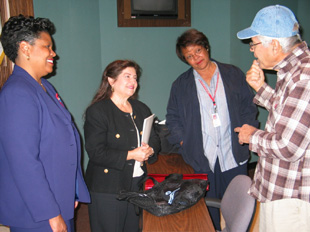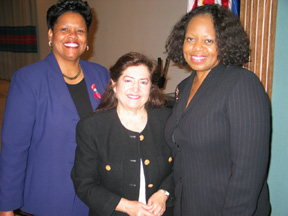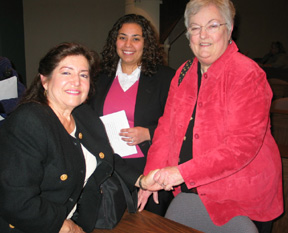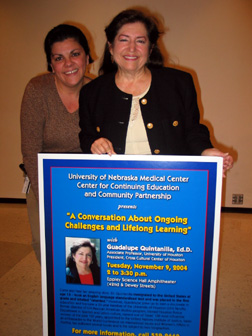 |
Dr. Quintanilla, second left, with Valda Boyd Ford, director, UNMC Community and Multicultural Affairs, left, Antonia Correa, PHAT Kidz project coordinator, Community and Multicultural Affairs, and South Omaha community activist Alberto Rodriguez. |
Dr. Quintanilla’s poignant rise from cultural adversity to three educational degrees and international acclaim enthralled more than 60 UNMC faculty, staff and South Omaha community members during her visit to UNMC on Nov. 9.
But, the road to success was not smooth. “My job in the classroom was to cut paper dolls, escort the children to the bathroom and act as a kind of room monitor when the class went to recess – I wasn’t allowed to go to recess with the children,” Dr. Quintanilla said. “Right there, so many issues of cultural competency come to mind. Obviously the school administrators should have known better, but they had been processing black and Hispanic children with indifference for generations.
On the other hand, Latino people traditionally consider the schoolteacher as almost a second parent. You never question what you are told. School officials said I was dumb and stupid – a ‘Yellow Bird’ they called me – and I accepted it and my parents did too. Nobody seemed to notice that all the Yellow Birds were black and Latino and all the smart kids – ‘Red Birds’ – were Caucasian.”
 |
Dr. Quintanilla, center, with Valda Boyd Ford, left, and Denise Maybank, Ph.D., assistant to the president, University of Nebraska-Lincoln. Dr. Maybank escorted Dr. Quintanilla the following day for her keynote presentation at Gov. Johann’s Summit on Workforce Development. |
“You must remember, I was just a little girl, and here are two Caucasian authority figures speaking to each other about something I’ve done,” Dr. Quintanilla said. “I still didn’t speak English and didn’t understand a word they said, but their body language told me all I needed to know. I have taught for years and always stress that even though someone doesn’t speak your language, people still can tell where you are coming from by your body language and voice tone, alone.
“I cried all the way home and all night over that incident and the next day told my parents that I could not go back to that school.”
So the future doctorate of education and 30-year faculty member at the University of Houston is still officially on the Brownsville school records as mentally retarded and a first grade dropout. She became what she called a “traditional Latina housewife” – cooking, cleaning, taking care of her husband and raising babies – and loved it. It was a world she thought was where she was supposed to be — until she took her own children to school and like herself, each was branded a slow learner and “Yellow Bird.”
It was to save her children, and by extension, another generation of Latino children from educational oblivion that led Dr. Quintanilla to rise up and fight her way to English competency and then English mastery and educational stardom. Her journey from childhood cultural humiliation to educational excellence and esteem is the very core of why she is such a requested speaker by students, community members, faculty peers, and public figures from ranging from city officials and mayors to governors and the President of the United States.
 |
Dr. Quintanilla, left, with Liliana Bronner, UNMC Rural Health Education Network, center, and Wenonah Bayer. |
Dr. Quintanilla’s staff has taught cultural competency training to the U.S. Secret Service,
Drug Enforcement Administration, military services and numerous law enforcement agencies across the nation, as well as the security forces for the Pan American Games and the Greece Olympic Games.
Dr. Quintanilla founded her cultural training center 27 years before the word “diversity” was used in public discourse. The motivation was poignant and succinct. Seven Latino children had died in a tragic house fire in Chicago and what hurt the most was that the firemen didn’t know enough elementary Spanish to direct the children to safety and the trapped Latinos didn’t know enough English to understand that they were being guided to life and not death. To Dr. Quintanilla, cultural competency starts by being able to cross culturally communicate in the simplest terms and understandings and build from there.
 |
Dr. Quintanilla, right, with Flower Nunez, director of interpreter services for The Nebraska Medical Center. |
She summarizes her life philosophy with three rules:
- Rule No. 1 – If something needs changing, I need to start by changing myself and doing it myself.
- Rule No. 2 – If you really want something to change, you first have to really understand exactly what it is you want to change.
- Rule No. 3 – If you really want something done, follow the chain of command, but never stop until you get what you want.
Without a high school diploma or even certificate of matriculation from elementary to middle school, Dr. Quintanilla pursued English language capability, inspired a dedicated teacher who helped her enroll in a neighboring community college and simultaneously worked on an associate degree on Monday-Wednesday-Friday, while attending a four-year college for her bachelor’s of science. She obtained both degrees with honors and never looked back.
“You want, you plan and you persist — we each are the architect of our own destiny,” Dr. Quintanilla said. “I have four children and each one is a doctorate – two attorneys and two medical doctors. That’s makes five doctorates in my home. When someone calls and asks to speak to Dr. Quintanilla, I love to ask them, ‘Which one do you want – the mentally retarded one or one of my four slow learners?'”